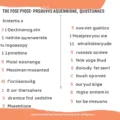Introduction to the Five Facet Mindfulness Questionnaire (FFMQ)
In our fast-paced world, finding moments of peace and self-awareness can be challenging. The Five Facet Mindfulness Questionnaire (FFMQ) offers a valuable tool for understanding and cultivating mindfulness in our daily lives. This comprehensive assessment helps individuals explore different aspects of mindfulness, promoting greater self-awareness, emotional balance, and overall well-being.
Understanding the Five Facets of Mindfulness
The FFMQ breaks down mindfulness into five key components:
- Observing: Noticing and attending to internal and external experiences
- Describing: Labeling experiences with words
- Acting with Awareness: Attending to one’s activities in the present moment
- Non-judging of Inner Experience: Taking a non-evaluative stance toward thoughts and feelings
- Non-reactivity to Inner Experience: Allowing thoughts and feelings to come and go without getting caught up in them
By exploring these facets, we can gain a deeper understanding of our mindfulness practice and identify areas for growth and development.
The Benefits of Using the FFMQ
Incorporating the FFMQ into your mindfulness journey can offer numerous benefits:
- Increased self-awareness and emotional intelligence
- Enhanced ability to manage stress and anxiety
- Improved focus and concentration
- Greater compassion for oneself and others
- Better overall mental health and well-being
By regularly assessing your mindfulness skills through the FFMQ, you can track your progress and celebrate your growth in cultivating a more mindful approach to life.
Practical Applications of the FFMQ
The FFMQ can be a valuable tool in various settings:
- Personal Growth: Use the questionnaire as a self-reflection tool to identify areas for improvement in your mindfulness practice.
- Therapeutic Settings: Mental health professionals can use the FFMQ to assess clients’ mindfulness skills and tailor interventions accordingly.
- Workplace Wellness: Organizations can incorporate the FFMQ into employee wellness programs to promote mindfulness and reduce workplace stress.
- Research: The FFMQ provides a standardized measure for studying mindfulness and its effects on various aspects of well-being.
By integrating the FFMQ into these different contexts, we can foster a more mindful and compassionate society.
Cultivating Mindfulness with the FFMQ
To enhance your mindfulness practice using insights from the FFMQ, consider the following strategies:
- Set aside time each day for formal mindfulness meditation
- Practice mindful breathing throughout the day
- Engage in body scan exercises to increase awareness of physical sensations
- Keep a mindfulness journal to describe your experiences
- Practice non-judgmental observation of your thoughts and feelings
Remember, mindfulness is a skill that can be developed with patience and consistent practice. The FFMQ serves as a guide to help you navigate your mindfulness journey with greater awareness and compassion.
Embracing Self-Compassion Through Mindfulness
As you explore the facets of mindfulness through the FFMQ, it’s essential to approach the process with self-compassion. Mindfulness isn’t about perfection or achieving a particular state; it’s about cultivating a kind and curious attitude towards your experiences. Here are some ways to incorporate self-compassion into your mindfulness practice:
- Treat yourself with the same kindness you would offer a good friend
- Recognize that struggles and imperfections are part of the shared human experience
- Practice self-soothing techniques when facing difficult emotions
- Celebrate small victories in your mindfulness journey
- Remember that mindfulness is a lifelong practice, and every moment is an opportunity to begin anew
By combining the insights from the FFMQ with a self-compassionate approach, you can create a more balanced, fulfilling, and mindful life.
FAQ: Understanding the Five Facet Mindfulness Questionnaire
1. How often should I take the FFMQ?
There’s no strict rule, but many find it helpful to complete the FFMQ every 3-6 months to track progress in their mindfulness journey. However, the frequency can be adjusted based on personal preferences and goals.
2. Can the FFMQ replace formal mindfulness training?
While the FFMQ is a valuable tool for assessment and self-reflection, it’s not a substitute for formal mindfulness training. It’s best used in conjunction with mindfulness practices and guidance from experienced teachers.
3. Are there any age restrictions for using the FFMQ?
The FFMQ was primarily developed for adults, but variations have been created for adolescents. It’s always best to consult with a mental health professional when using assessment tools with younger populations.
4. Can the FFMQ help with specific mental health conditions?
While the FFMQ isn’t a diagnostic tool, it can be helpful in understanding mindfulness skills related to various mental health conditions. Many studies have shown correlations between mindfulness facets and symptoms of anxiety, depression, and stress.
5. Is it normal to have varying scores across the five facets?
Absolutely! It’s common to have strengths in some areas and room for growth in others. The FFMQ helps you identify these variations, allowing you to tailor your mindfulness practice to areas that may need more attention.









